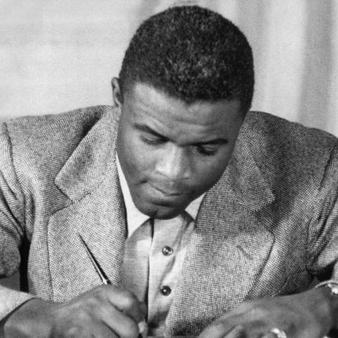What was Jesse Owens' Net Worth?
Jesse Owens was an American track and field athlete who had a net worth of $150,000 at the time of his death in 1980. That's the same as around $550,000 in today's dollars. Jesse Owens is widely regarded as one of the greatest athletes of all time. He is best known for his extraordinary performance at the 1936 Berlin Olympics, where he won four gold medals in track and field events, breaking multiple world records in the process. esse was said to have "single-handedly crushed Hitler's myth of Aryan supremacy". Owens' remarkable achievements on the track and his groundbreaking impact on race relations and civil rights in America have earned him a permanent place in history.
Early Life
James Cleveland "Jesse" Owens was born on September 12, 1913, in Oakville, Alabama. His parents, Henry and Mary Owens, were sharecroppers who struggled to make ends meet. Jesse was the youngest of ten children, and his family moved to Cleveland, Ohio, when he was nine years old. Owens attended East Technical High School, where he first showed his talent for track and field. He set a national high school record in the long jump, and he became the first high school athlete to run the 100-yard dash in under ten seconds. Despite his impressive performances, Owens faced racial discrimination throughout his early life, and he often had to compete in separate events from white athletes.
Olympic Career
Owens attended Ohio State University, where he continued to dominate in track and field. In 1935, he set three world records and tied another in the span of 45 minutes at the Big Ten Championships. The following year, he made history at the 1936 Berlin Olympics. Despite the Nazi regime's racist ideology and Adolf Hitler's belief in the supremacy of the Aryan race, Owens won four gold medals, in the 100-meter dash, the 200-meter dash, the long jump, and the 4×100-meter relay. He broke two Olympic records and tied another, and he set a world record in the long jump, which stood for 25 years. Owens' remarkable performance was a powerful statement against racism and discrimination, and it helped to pave the way for future generations of Black athletes.
After the Olympics, Owens returned to the United States to a hero's welcome. He continued to compete in track and field events, but he faced financial difficulties and struggled to find work. He eventually turned to professional sports, playing basketball and running in exhibition races. He also worked as a speaker and spokesperson for various organizations, advocating for civil rights and racial equality.

Getty
Personal Life
In 1935, Owens married Minnie Ruth Solomon, and they had three daughters together. Owens was a devoted family man, but he faced challenges in his personal life. He struggled with financial instability and suffered from health problems, including chronic lung disease. Despite these difficulties, he remained committed to his family and his advocacy work, using his platform to speak out against racism and discrimination.
Owens filed for bankruptcy and was successfully prosecuted for tax evasion before becoming a goodwill ambassador for the US. Jesse Owens passed away on March 31, 1980, at 66 years old from lung cancer.
Legacy, Honors & Awards
Jesse Owens' impact on sports and civil rights is immeasurable. He inspired generations of Black athletes to pursue their dreams and to fight against discrimination in all forms. In recognition of his achievements, Owens received numerous honors and awards throughout his life, including the Presidential Medal of Freedom, the highest civilian honor in the United States. He was also inducted into the International Olympic Committee Hall of Fame and the United States Olympic Hall of Fame. The Jesse Owens Award is the highest accolade given to the year's best track and field athlete.
Owens' legacy continues to inspire people around the world. His triumph at the 1936 Olympics is a testament to the power of perseverance and determination in the face of adversity. Owens' courage and talent paved the way for future generations of athletes, and his advocacy work helped to advance the cause of civil rights and racial equality in America. Today, Jesse Owens is remembered as a true American hero, whose legacy will continue to inspire people for generations to come.








